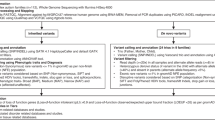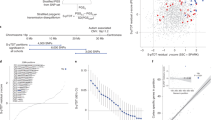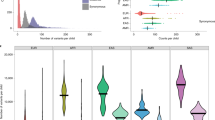Abstract
We performed a genome-wide linkage scan using highly polymorphic microsatellite markers. To minimize genetic heterogeneity, we focused on sibpairs meeting the strict diagnosis of autism. In our primary analyses, we observed a strong linkage signal (P=0.0006, 133.16 cM) on chromosome 7q at a location coincident with other linkage studies. When a more relaxed diagnostic criteria was used, linkage evidence at this location was weaker (P=0.01). The sample was stratified into families with only male affected subjects (MO) and families with at least one female affected subject (FC). The strongest signal unique to the MO group was on chromosome 11 (P=0.0009, 83.82 cM), and for the FC group on chromosome 4 (P=0.002, 111.41 cM). We also divided the sample into regression positive and regression negative families. The regression-positive group showed modest linkage signals on chromosomes 10 (P=0.003, 0 cM) and 14 (P=0.005, 104.2 cM). More significant peaks were seen in the regression negative group on chromosomes 3 (P=0.0002, 140.06 cM) and 4 (P=0.0005, 111.41 cM). Finally, we used language acquisition data as a quantitative trait in our linkage analysis and observed a chromosome 9 signal (149.01 cM) of P=0.00006 and an empirical P-value of 0.0008 at the same location. Our work provides strong conformation for an autism locus on 7q and suggestive evidence for several other chromosomal locations. Diagnostic specificity and detailed analysis of the autism phenotype is critical for identifying autism loci.
This is a preview of subscription content, access via your institution
Access options
Subscribe to this journal
Receive 12 print issues and online access
$259.00 per year
only $21.58 per issue
Buy this article
- Purchase on SpringerLink
- Instant access to full article PDF
Prices may be subject to local taxes which are calculated during checkout







Similar content being viewed by others
References
Werner E, Dawson G . Validation of the phenomenon of autistic regression using home videotapes. Arch Gen Psychiatry 2005; 62: 889–895.
Folstein S, Rutter M . Infantile autism: a genetic study of 21 twin pairs. J Child Psychol Psychiatry 1977; 18: 297–321.
Ritvo ER, Freeman BJ, Mason-Brothers A, Mo A, Ritvo AM . Concordance for the syndrome of autism in 40 pairs of afflicted twins. Am J Psychiatry 1985; 142: 74–77.
Folstein S, Rutter M . Genetic influences and infantile autism. Nature 1977; 265: 726–728.
Bailey A, Le Couteur A, Gottesman I, Bolton P, Simonoff E, Yuzda E et al. Autism as a strongly genetic disorder: evidence from a British twin study. Psychol Med 1995; 25: 63–77.
Steffenburg S, Gillberg C, Hellgren L, Andersson L, Gillberg I, Jakobsson G et al. A twin study of autism in Denmark, Finland, Iceland, Norway, and Sweden. J Child Psychol Psychiatry 1989; 30: 405–416.
August GJ, Stewart MA, Tsai L . The incidence of cognitive disabilities in the siblings of autistic children. Br J Psychiatry 1981; 138: 416–422.
Bailey A, Phillips W, Rutter M . Autism: towards an integration of clinical, genetic, neuropsychological, and neurobiological perspectives. J Child Psychol Psychiatry 1996; 37: 89–126.
Smalley SL, Asarnow RF, Spence A . Autism and genetics. Arch Gen Psychiatry 1988; 45: 953–961.
Delong GR, Dwyer JT . Correlation of family history with specific autistic subgroups: Aspergers and bipolar affective disease. J Autism Dev Disord 1988; 18: 593–600.
Vorstman JA, Staal WG, Hochstenbach PF, Franke L, van Daalen E, van Engeland H . Overview of cytogenetic regions of interest (CROIs) associated with the autism phenotype across the human genome. Mol Psychiatry 2006; 11: 18–28.
Auranen M, Vanhala R, Varilo T, Ayers K, Kempas E, Ylisaukko-oja T et al. A genomewide screen for autism-spectrum disorders: evidence for a major susceptibility locus on chromosome 3q25–27. Am J Hum Genet 2002; 71: 777–790.
Buxbaum JD, Silverman JM, Smith CJ, Kilifarski M, Reichert J, Hollander E et al. Evidence for a susceptibility gene for autism on chromosome 2 and for genetic heterogeneity. Am J Hum Genet 2001; 68: 1514–1520.
Cantor RM, Kono N, Duvall JA, AlvarezRetuerto A, Stone JL, Alarcon M et al. Replication of autism linkage: fine-mapping peak at 17q21. Am J Hum Genet 2005; 76: 1050–1056.
Barrett S, Beck JC, Bernier R, Bisson E, Braun TA, Casavant TL et al. An autosomal genomic screen for autism. Am J Med Genet 1999; 88: 609–615.
International Molecular Genetic Study of Autism Consortium. A genomewide screen for autism: strong evidence for linkage to chromosomes 2q, 7q, and 16p. Am J Hum Genet 2001; 69: 570–581.
Lamb JA, Barnby G, Bonora E, Sykes N, Bacchelli E, Blasi F et al. Analysis of IMGSAC autism susceptibility loci: evidence for sex limited and parent of origin specific effects. J Med Genet 2005; 42: 132–137.
Philippe A, Martinez M, Guilloudbataille M, Gillberg C, Rastam M, Sponheim E et al. Genome-wide scan for autism susceptibility genes. Hum Mol Genet 1999; 8: 805–812.
Risch N, Spiker D, Lotspeich L, Nouri N, Hinds D, Hallmayer J et al. A genomic screen of autism: evidence for a multilocus etiology. Am J Hum Genet 1999; 65: 493–507.
Stone JL, Merriman B, Cantor RM, Yonan AL, Gilliam TC, Geschwind DH et al. Evidence for sex-specific risk alleles in autism spectrum disorder. Am J Hum Genet 2004; 75: 1117–1123.
McCauley JL, Li C, Jiang L, Olson LM, Crockett G, Gainer K et al. Genome-wide and Ordered-Subset linkage analyses provide support for autism loci on 17q and 19p with evidence of phenotypic and interlocus genetic correlates. BMC Med Genet 2005; 6: 1.
Liu JJ, Nyholt DR, Magnussen P, Parano E, Pavone P, Geschwind D et al. A genomewide screen for autism susceptibility loci. Am J Hum Genet 2001; 69: 327–340.
Shao YJ, Wolpert CM, Raiford KL, Menold MM, Donnelly SL, Ravan SA et al. Genomic screen and follow-up analysis for autistic disorder. Am J Med Genet 2002; 114: 99–105.
Yonan AL, Alarcon M, Cheng R, Magnusson PKE, Spence SJ, Palmer AA et al. A genomewide screen of 345 families for autism-susceptibility loci. Am J Hum Genet 2003; 73: 886–897.
IMGSAC. A full genome screen for autism with evidence for linkage to a region on chromosome 7q. International Molecular Genetic Study of Autism Consortium. Hum Mol Genet 1998; 7: 571–578.
Wassink TH, Brzustowicz LM, Bartlett CW, Szatmari P . The search for autism disease genes. Mental Retard Dev Disabil Res Rev 2004; 10: 272–283.
Molloy CA, Keddache M, Martin LJ . Evidence for linkage on 21q and 7q in a subset of autism characterized by developmental regression. Mol Psychiatry 2005; 10: 741–746.
Alarcon M, Cantor RM, Liu J, Gilliam TC, the Autism Genetic Resource Exchange Consortium, Geschwind DH . Evidence for a language quantitative trait locus on chromosome 7q in multiplex families. Am J Hum Genet 2002; 70: 60–71.
Alarcon M, Yonan AL, Gilliam TC, Cantor RM, Geschwind DH . Quantitative genome scan and Ordered-Subsets Analysis of autism endophenotypes support language QTLs. Mol Psychiatry 2005; 10: 747–757.
Bradford Y, Braun T, Cassavant T, Folstein S, Haines J, Hutcheson H et al. Incorporating language phenotypes strengthens evidence of linkage to autism. Am J Med Genet 2001; 105: 539–547.
Buxbaum JD, Silverman J, Keddache M, Smith CJ, Hollander E, Ramoz N et al. Linkage analysis for autism in a subset families with obsessive-compulsive behaviors: evidence for an autism susceptibility gene on chromosome 1 and further support for susceptibility genes on chromosome 6 and 19. Mol Psychiatry 2004; 9: 144–150.
Lord C, Rutter M, Le Couteur A . Autism Diagnostic Interview Revised: a revised version of a diagnostic interview for caregivers of individuals with possible pervasive developmental disorders. J Autism Dev Disord 1994; 24: 659–685.
Lord C, Risi S, Lambrecht L, Cook EH, Leventhal BL, DiLavore P et al. The Autism Diagnostic Observation Schedule-Generic: a standard measure of social and communication deficits associated with the spectrum of autism. J Autism Develop Disord 2000; 30: 205–223.
American Psychiatric Association. Diagnostic and statistical manual of mental disorders, 4th edn. American Psychiatric Association: Arlington, VA, 1994, pp 65–78.
Mullen EM . Mullen Scales of Early Learning. Western Psychological Services: Los Angeles, CA, 1997.
Sattler J . Assessment of Children: Cognitive Applications. Jerome Sattle, Publisher, Inc.: La Mesa, CA, 1992.
Epstein MP, Duren WL, Boehnke M . Improved inference of relationship for pairs of individuals. Am J Hum Genet 2000; 67: 1219–1231.
Heath SC . Markov chain Monto Carlo segregation and linkage analysis for oligogenic models. Am J Hum Genet 1997; 61: 748–760.
Abecasis G, Cherny S, Cookson W, Cardon L . Merlin-rapid analysis of dense genetic maps using sparse gene flow trees. Nat Genet 2002; 30: 97–101.
Kong X, Murphy K, Raj T, He C, White PS, Matise TC . A combined linkage-physical map of the human genome. Am J Hum Genet 2004; 75: 1143–1148.
Whittemore AS, Halpern J . A class of tests for linkage using affected pedigree members. Biometrics 1994; 50: 118–127.
Kong A, Cox NJ . Allele-sharing models. LOD scores and accurate linkage tests. Am J Hum Genet 1997; 61: 1179–1188.
Amos C . I. Robust variance-components approach for assessing genetic linkage in pedigrees. Am J Hum Genet 1994; 54: 535–543.
Daw E, Thompson E, Wijsman E . Bias in multipoint linkage analysis arising from map misspecification. Genet Epidemiol 2000; 19: 336–380.
Shao YJ, Raiford KL, Wolpert CM, Cope HA, Ravan SA, Ashley-Koch AA et al. Phenotypic homogeneity provides increased support for linkage on chromosome 2 in autistic disorder. Am J Hum Genet 2002; 70: 1058–1061.
Badner JA, Gershon ES . Regional meta-analysis of published data supports linkage of autism with markers on chromosome 7. Mol Psychiatry 2002; 7: 56–66.
Trikalinos TA, Karvouni A, Zintzaras E, Ylisaukkooja T, Peltonen L, Jarvela I et al. A heterogeneity-based genome search meta-analysis for autism-spectrum disorders. Mol Psychiatry 2006; 11: 29–36.
Persico AM, D'Agruma L, Malorano N, Totaro A, Militerni R, Bravaccio C et al. Reelin gene alleles and haplotypes as a factor predisposing to autistic disorder. Mol Psychiatry 2001; 6: 150–159.
Lai CSL, Fisher SE, Hurst JA, Vargha-Khadem F, Monaco AP . A forkhead-domain gene is mutated in a severe speech and language disorder. Nature 2001; 413: 519–523.
Vincent JB, Herbrick J-A, Gurling HMD, Bolton PF, Roberts W, Scherer SW . Identification of a novel gene on chromosome 7q31 that is interrupted by a translocation breakpoint in an autistic individual. Am J Hum Genet 2000; 67: 510–514.
Wassink TH, Piven J, Vieland VJ, Huang J, Swiderski RE, Pietila J et al. Evidence supporting WNT2 as an autism susceptibility gene. Am J Med Genet 2001; 105: 406–413.
Sultana R, Yu C-E, Yu J, Munson J, Chen D, Hua W et al. A candidate gene for autism on chromosome 7. Genomics 2002; 80: 129–134.
Benayed R, Gharani N, Rossman I, Mancuso V, Lazar G, Kamdar S et al. Support for the homeobox transcription factor gene ENGRAILED 2 as an autism spectrum disorder susceptibility locus. Am J Hum Genet 2005; 77: 851–868.
O'Brien EK, Zhang XY, Nishimura C, Tomblin JB, Murray JC . Association of specific language impairment (SLI) to the region of 7q31. Am J Hum Genet 2003; 72: 1536–1543.
Kaminen N, Hannula-Jouppi K, Kestila M, Lahermo P, Muller K, Kaaranen M et al. A genome scan for developmental dyslexia confirms linkage to chromosome 2p11 and suggests a new locus on 7q32. J Med Genet 2003; 40: 340–345.
Baron-Cohen S, Knickmeyer RC, Belmonte MK . Sex differences in the brain: implications for explaining autism. Science 2005; 310: 819–823.
Le Couteur A, Rutter M, Lord C, Rios P, Robertson S, Holdgrafer M et al. Autism diagnostic interview: a standardized investigator-based instrument. J Autism Dev Disord 1989; 19: 363–387.
Sung YJ, Dawson G, Munson J, Estes A, Schellenberg GD, Wijsman EM . Genetic investigation of quantitative traits related to autism: use of a multivariate polygenic models with ascertainment adjustment. Am J Hum Genet 2005; 76: 68–81.
Dawson G, Estes A, Munson J, Schellenberg GD, Bernier R, Abbott R et al. Quantitative assessment of autism symptoms in autism probands and parents: Broader Phenotype Autism Symptom Scale. J Autism Dev Disord 2006 (in press).
Wijsman E, Amos C . Genetic analysis of simulated oligogenic traits in nuclear and extended pedigrees: summary of GAW10 contributions. Genet Epidemiol 1997; 14: 719–735.
Acknowledgements
This research was supported by a program project grant from the National Institute of Child Health and Human Development and the National Institute on Deafness and Communication Disability (PO1HD34565), which is part of the NICHD/NIDCD Collaborative Program of Excellence in Autism. We gratefully acknowledge the contributions of the Diagnostic and Statistical Cores of the UW Autism Program Project, Cathy Brock who assisted in recruitment of participants, Hiep Nguyen for computer support, and the parents and their children who participated in this study. This work was also supported in part by the Veterans Affairs Administration (GDS). Work at the University of Utah was supported by NICHD Grant HD35476, Grant MO1-RR00064 from the National Center for Research Resources, the Devonshire Foundation and the Utah Autism Research Foundation.
Author information
Authors and Affiliations
Corresponding author
Additional information
Electronic-Database Information
The URLs for data presented herein are as follows:
Online Mendelian Inheritance in Man (OMIM), http://www.ncbi.nlm.nih.gov/Omim.
Rutgers Genetic Map (MAP-O-MAT), http://compgen.rutgers.edu/mapomat.
Supplementary Information accompanies the paper on the Molecular Psychiatry website (http://www.nature.com/mp)
Supplementary information
Rights and permissions
About this article
Cite this article
Schellenberg, G., Dawson, G., Sung, Y. et al. Evidence for multiple loci from a genome scan of autism kindreds. Mol Psychiatry 11, 1049–1060 (2006). https://doi.org/10.1038/sj.mp.4001874
Received:
Revised:
Accepted:
Published:
Issue Date:
DOI: https://doi.org/10.1038/sj.mp.4001874
Keywords
This article is cited by
-
Corticostriatal dysfunction and social interaction deficits in mice lacking the cystine/glutamate antiporter
Molecular Psychiatry (2021)
-
New Genetic Approaches for Early Diagnosis and Treatment of Autism Spectrum Disorders
Review Journal of Autism and Developmental Disorders (2019)
-
Developmental neurogenetics and multimodal neuroimaging of sex differences in autism
Brain Imaging and Behavior (2017)
-
Whole exome sequencing in extended families with autism spectrum disorder implicates four candidate genes
Human Genetics (2015)
-
Replication of linkage at chromosome 20p13 and identification of suggestive sex-differential risk loci for autism spectrum disorder
Molecular Autism (2014)



